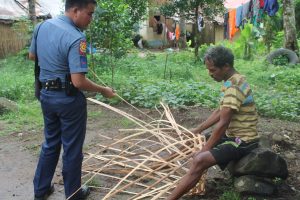“Reorienting Education and Training Systems to Improve the Lives of Indigenous Youth” (2017-2020) is a major global research project of the UNESCO Chair within the context of Sustainable Development Goal 4. Spanning approximately 40 countries, this project aims to improve the lives of Indigenous youth, in or from traditional communities by enhancing the quality of their education and training.
Although, we are primarily intending to change education structures and systems by developing research-based policy recommendations, sometimes our project takes a more direct approach to improving Indigenous lives.
The following excerpts are from a note we received from Janet Espada, the lead project researcher at Leyte Normal University in the Philippines, a project partner institution that I had the pleasure of visiting early last year. After seeing the situation the Indigenous Peoples (IP) were facing in their relocated community, the President of LNU, Dr. Jude Duarte, helped Professor Espada go far beyond the initial concept of the research:

“… we chose the Migrant Mamanwa of Basey, Samar, a small community that has around 80 members composed of elders, parents, adolescents, children, toddlers and infants. …I organized a whole team comprised of faculty belonging to various disciplines- languages and literature, music, arts, physical education, professional education, social science, communication arts, science, tourism, hotel and restaurant management. The President and I decided to go beyond demographics. We are conducting a cultural mapping in order to document their life and culture. Our main goal is to put all the data in books and manuals as we intend to document, for instance, their vanishing language, rituals, beliefs, culinary arts, music, dances, etc...practically all about them aside from their profiles. After writing the books we will give these back to them along with a contextualized education. We will train their young to teach their own cultural knowledge and skills to elevate their self-esteem and convert their self-concept to something positive and of course in order to sustain their education. We will also partner with the Department of Health, Engineering, etc. and on Education- especially the school heads where the Indigenous Peoples are mainstreamed so that the children will be taken care of by the teachers. On Nov. 18, 2017 we held the MoC signing in their community in Basey (which Charles visited last time) which was attended by the Mamanwas, the LNU faculty, the Mayor's representative, the Barangay Captain and the teachers handling the IP children. Then after we gave an orientation of the project we had them sign the informed consent in preparation for the interviews and data gathering.
Although we are focusing on certain areas of their lives for research, we are also taking care of some of their problems. They have a very wide stagnant water which we will fix through our engineering unit. Our health team headed by our medical practitioners are planning to conduct a medical mission and health program. Later on, we plan to introduce crops in order to make their livelihood sustainable. We will partner with the Department of Agriculture. We will build a simple production area where they can make traditional crafts and other products. We will tap the help of the Department of Trade and Industry. We have also prepared bundles of joy for them (various foods and goodies for the holidays). The other student organizations will likewise donate goods and are also involved in the extension work. Literally, all of us are moving towards the progress of this small community which we hope to see rising from the rubbles before 2020. As you can see, creating a network of agencies that can help us in the future is highly inevitable. We need to introduce the IPs to the various government agencies whom they can approach for help when the project is over. …“
